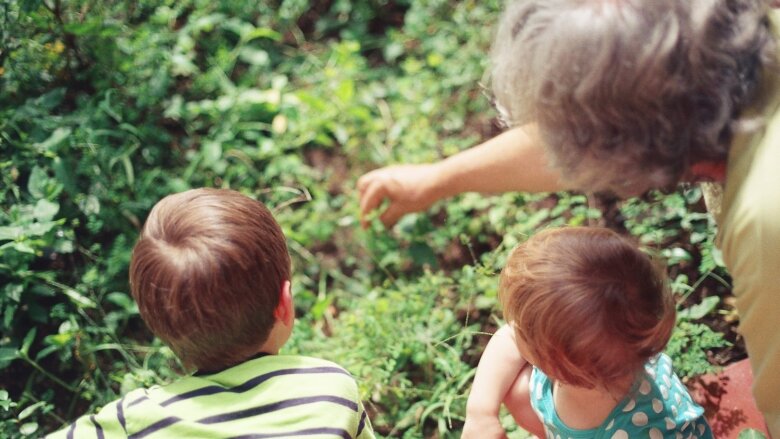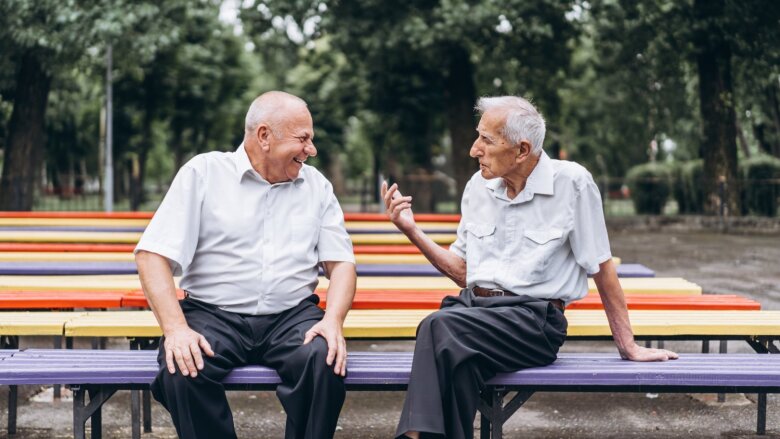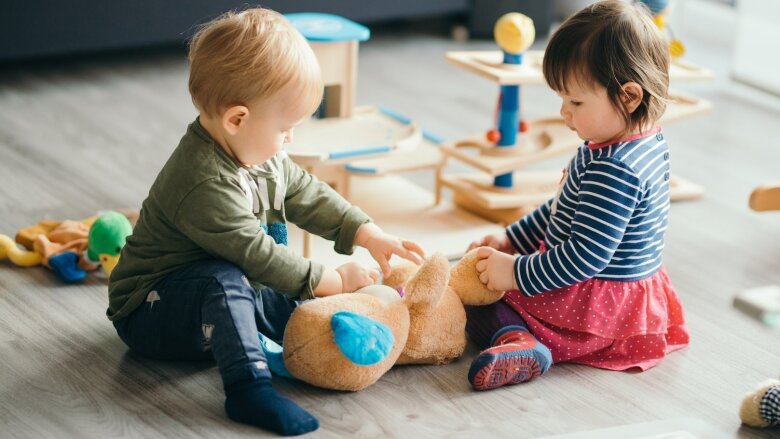
Our research focuses on the development of socio-emotional and self-regulatory processes, and the acquisition and consequences of subjective beliefs about development and aging. We investigate children, adolescents, and adults from various age groups, including very old age. Our methodological approach is characterized by an emphasis on longitudinal and measurement-burst studies. A unique feature of our work is the combination of ambulatory assessment methodologies, which allow measurements of experiences, cognitive capacities, and physiological processes as they naturally occur in daily-life contexts, with behavioral observations and experimental paradigms.
-
Development of Ageing-Attitudes
Beliefs and ideas about aging begin to form early in life. Many events signal the importance of age for our social selves: birthday parties, entrance to school, or acquiring a driver’s license. Children are sorted into classrooms based on age and the work opportunities available to adults often hinge on age. In a series of studies we investigate how individuals learn about and form attitudes regarding age, ageing, and age-groups, and how these attitudes influence our treatment of those who are older or younger than ourselves.
Funding: Program Line B, FSU Jena
Investigators at FSU Jena
Jenny Jaquet, M.Sc.
Dr. Antje Rauers
Prof. Dr. Michaela RiedigerCollaborators
Prof. Dr. Anna KornadtExternal link
Dr. David WeissExternal linkChildren and nature
Image: by Nikoline Arns on Unsplash -
Digital and in-person: Interpersonal Contact within Families
What makes a conversation a good conversation? And which opportunities does modern technology create for family interactions? Our current DFG-funded project on family interactions in digital and physical space seeks to answer these questions. Maintaining contact with family members is very important to many people. In current times, interactions do not only take place in person, but also digitally. Therefore, we use various methods to investigate how family members of different age groups communicate with each other and which circumstances can promote good contact within the family. For this purpose, we analyze conversations between family members in video calls and face-to-face conversations. During these conversations, we record participants’ behavior, speech and heart rates, as well as their personal experience. The project is being conducted in two German cities (Jena and Berlin) in collaboration with the Medical School Berlin.
Funding
German Research Foundation (DFG)Investigators at FSU Jena
Lara Schießl, M. Sc.
Jenny Schröder, M. Sc.
Dr. Antje Rauers
Prof. Dr. Michaela Riediger
Collaborator
Prof. Dr. Uwe AltmannExternal link (Medical School Berlin)Happy senior couple doing video call at home
Image: Rido - stock.adobe.com -
Emotion regulation across cultures
The world-wide Covid-19 pandemic, und the measures taken to contain it, have drastically altered the everyday lives of millions of people worldwide. In this international, cross-cultural collaboration we conducted an online survey among young adults in Germany in 2020 and 2021. The aim of these studies was to investigate which challenges people were facing during the time of restrictions for public life and social contacts, and how people deal with these challenges. Among other things, the project investigates which strategies people employ to deal with negative emotions they experience in the context of the pandemic. Our survey represents the German contribution to a cross-cultural collaboration among scientists from 19 different countries. The international project is coordinated, and the data analyzed, by Prof. Maya TamirExternal link (The Hebrew University, Jerusalem).
Funding: FSU Jena
Investigators at FSU Jena
Dr. Antje RauersExternal link
Julia A. Freitag, M.Sc.
Prof. Dr. Michaela RiedigerExternal link
Collaborators
Prof. Maya Tamir, PhDExternal link (The Hebrew University, Jerusalem) -
Interpersonal Coordination and Understanding among Older Adults
Interaction
Image: bedya - stock.adobe.comTalking to others to share good news, concerns, or recent experiences is part of everyday life. Such interactions provide the stage for important areas of development throughout the entire life course; they may also facilitate and influence individual development. In this DFG-funded project, we use multiple methods to investigate how older adults behave and understand each other during conversations. What interpersonal mechanisms contribute to successful interactions? How do people differ in this regard, and can we influence these differences? How do speakers and listeners contribute to mutual understanding, and what is the role of verbal, paraverbal, and nonverbal signals? We investigate these and other lifespan-related questions using experiments and self-reports as well as linguistic and video analyses.
Funding
German Research Foundation (DFG)Investigators at FSU Jena
Prof. Dr. Michaela Riediger
Dr. Antje Rauers
Jenny Jaquet, M. Sc.
Alissa von Großmann, M. Sc.Collaborator
Prof. Dr. Uwe AltmannExternal link (Medical School Berlin) -
The Multi-Method Ambulatory Assessment (MMAA) Project
Man with mobile phone
Image: iStock.com/northlightimagesThis longitudinal project charts everyday affective processes and their interrelations with motivational and cognitive processes over time, as they naturally occur in the daily lives and natural environments of children, adolescents, and adults from various age groups. To meet this aim, we combine ambulatory assessment methodologies, which allow measurements of experiences, cognitive capacity, and physiological processes in daily-life contexts, with interview techniques and experimental paradigms. Ambulatory assessment methods include mobile-phone based experience sampling and ambulatory bio-monitoring (e.g., of cardiac and physical activity, hormone concentrations). The project was initiated in 2007. Since then, five measurement waves have been completed with more than 600 participants ranging in age from childhood to very old adulthood.
Funding: Federal Ministry of Education and Research (MPI001 and 01UW0706), Max Planck Society for the Advancement of Sciences, German Research Foundation (RI 1797/4-1), FSU Jena
Investigators at FSU Jena
Prof. Dr. Michaela Riediger
Collaborators
Prof. Dr. Gert G. WagnerExternal link (DIW and MPI for Human Development, Berlin)
Prof. Dr. Gloria LuongExternal link (Colorado State University)
Prof. Dr. Cornelia WrzusExternal link (Universität Heidelberg)
Prof. Dr. Florian SchmiedekExternal link (DIPF, Frankfurt am Main)
Prof. Dr. Manuel VoelkleExternal link (HU, Berlin)
M.Sc. Manuel ArnoldExternal link (HU, Berlin)
-
Meaning of Emotion Words
Building
Image: iStock.com/michellegibsonHow are you feeling today? Happy? Upset? Anxious? Words are one way we communicate our emotional experiences. However, the precise meaning we intend to convey with emotion words may vary between individuals, cultures, and time periods. In this project we investigate similarities and differences between people and groups in the semantic meaning of emotion words.
Investigators at FSU Jena
Prof. Dr. Michaela Riediger
Dr. Jennifer A. Bellingtier
Dr. Antje RauersCollaborators
Madi Nichols (Furman University)
Dr. Frances Buttelman (CELISE Guest Scientist) -
Measurement effects in research on affective development
Empirical evidence on how affective experiences change over the lifespan paints a heterogeneous picture depending on a variety of factors. One source of variability is the diversity of studied affective facets that range from general well-being over affect dimension (e.g., positive vs. negative affect) to distinct emotions (e.g., anger, sadness). In addition, researchers rely on diverse measures that, amongst others, refer to different time frames of affective experience (e.g., momentary or retrospective) and answering scales (e.g., intensity or frequency). Evidence suggests that these characteristics are associated with variance in individual reports as they depend on different memory systems, require different levels of abstraction, and/or tackle distinct affective features. Hence, they may also be related to differences in affective change over the lifespan. In the present project, we capitalize on existing longitudinal data on mean-level change in affect and apply meta-analytical procedures to address that question.
Investigators at FSU Jena
Dr. Anja Blumenthal de
Prof. Dr. Michaela RiedigerCollaborators
Prof. Dr. Cornelia WrzusExternal link (Universität Heidelberg) -
Mindfulness and Anticipatory Coping Everday (MACE)
Woman with headache
Image: Kekyalyaynen/ShutterstockStressors pose a major threat to health and well-being across the lifespan. Although most previous research has focused on the health implications of stressors that have already occurred, recent work suggests that one promising avenue for reducing the negative impact of stressors is to focus on coping behaviors that occur prior to the stressor's occurrence, including mindfulness and anticipatory coping. Using daily diary methodology, this international cooperation project that was initiated at the North Carolina State University examines naturally occurring stressors in the lives of younger and older adults. We seek to understand the personal, contextual, and daily factors associated with maintaining well-being in the face of daily stressors.
Funding: North Carolina State University
Investigator at FSU Jena
Dr. Jennifer A. Bellingtier
Collaborators
Dr. Shevaun D. NeupertExternal link (Principal Investigator; NC State University)
B.S. Emily L. SmithExternal link (NC State University) -
Multicenter Collaboration: Socioemotional Development and Health
Couple
Image: iStock.com/pklineThe purpose of this collaboration is to shed light on the interplay of socioemotional and health development across the lifespan. Our current focus is on empathic accuracy, that is, the ability to infer other persons' thoughts and feelings. How do people from various age groups arrive at such judgments? Are there age-related differences and if so, why? To what extent do these differences reflect age-related changes and/or different socialization experiences? Is empathic accuracy differentially important for social and health outcomes in different age groups? We approach these questions by comparing people from different age groups and by longitudinally following them up over time, using multiple methods such as experience-sampling and experiments. Researchers from the Friedrich Schiller University Jena, the Freie Universität Berlin, der Humboldt-Universität zu Berlin und der Friedrich-Alexander-Universität Erlangen-Nürnberg work together on this project.
Investigators at FSU Jena
Prof. Dr. Michaela Riediger
Dr. Antje Rauers
Dr. Andrea Schlesier-Michel
Dr. Elisabeth S. Blanke
Collaborators
Dr. Sandra DüzelExternal linkExternal linkExternal link (MPI for Human Development, Berlin)
Dr. Jan KellerExternal linkExternal linkExternal link (FU Berlin)
Prof. Dr. Nina KnollExternal linkExternal linkExternal link (FU Berlin)
Prof. Dr. Nicolas RohlederExternal linkExternal linkExternal link (FAU Erlangen-Nürnberg)
Dr. Ursula SchadeExternal linkExternal linkExternal link (FAU Erlangen-Nürnberg)
Prof. Dr. Ute KunzmannExternal linkExternal linkExternal link (Universität Leipzig)
Dr. Cornelia WieckExternal linkExternal linkExternal link (Universität Leipzig)
PD Dr. Uwe AltmannExternal linkExternal linkExternal link (FSU Jena)
M.Sc. Maria BlöchlExternal linkExternal linkExternal link (Universität Leipzig) -
People in my Life: Children's Perspectives on Close Relationships
How do reliable and warm relationships in childhood support and protect the children's psychosocial development and health? What can we learn by considering the children's own perspectives on their close relationships? These questions are at the center of this project that evolved from the interdisciplinary innovation project "People in My Life" in 2016, a project funded by the Jacobs FoundationExternal link and inspired by the vision to foster inclusion of children's perspectives in social work practice and developmental research. In this international collaboration, developmental psychologists, computer scientists, and social psychologists developed a novel iPad application to assess subjective perceptions of closeness to family and community members. Follow-up projects using this application focused, among other things, on various dimensions of relationship closeness as reflected in children's free play, and investigated associations with the children's psychosocial adjustment and health.
Funding: Jacobs Foundation (January-December 2016) and FSU Jena
Investigator at FSU Jena
Dr. Antje Rauers
Collaborators
Dr. Sevasti-Melissa NolasExternal link (Goldsmiths University of London)
Prof. Dr. Johannes SchöningExternal link (University of Bremen)
Florian HellerExternal link (Hasselt University, Belgium)Tablet with figures
Image: Lisa Jacob; People in my Life Project -
Promoting intergroup relations through humanitarian values
A stated educational goal worldwide is to improve socio-emotional competencies in adolescents and young adults. So far, however, there are few randomised controlled trials testing the effects of such educational interventions. The Global CORE randomised controlled trial tests the impact of multi-day socio-emotional training on conflict behaviour and resilience among adolescents and young adults in countries with different levels of conflict: South Sudan, Zambia and France. We are working together with the Swiss Ministry of Foreign Affairs, the University of Teacher Education Zug and local organisations. The findings of this study will be used in the further development of educational measures.
Investigator at FSU Jena
Dr. Olga KlimeckiConflicts
Image: deagreez - stock.adobe.com -
Social-Cognitive Development From Infancy Into Childhood
Playing children
Image: veryulissa/ShutterstockEmerging social-cognitive skills plays a major role in infants' and children's cognitive, social and emotional development. Research in this area encompasses individuals' thoughts and beliefs about the social world, including skills that facilitate the understanding of their own and others' desires and emotions. Further, it is important to understand how infants' and children's environments can affect the development of these skills.
In the current study, we investigate helping behavior at 16 months of age and how environmental factors affect their development. In this project, we combine several methods including experimental paradigms and parental questionnaires.Investigator at FSU Jena
Dr. Frances Buttelmann
External Collaborator
PD Dr. David ButtelmannExternal link (University of Bern) -
Tune Yourself in: Music Preferences and Affect Regulation from Childhood to Old Age
Music can express different moods, and it can also affect the listeners' emotional experience: Listening to music can make oneself feel happy, thoughtful or melancholic; it can stir oneself up, or calm oneself down. But how does the perception of emotional expressions of music develop from childhood to old age? What music do individuals from different age groups prefer in different situations and why? Are there age differences in the mood-regulatory effects of music listening? In this project, we combine experimental paradigms and survey methodologies to investigate these and other questions.
Funding: Max Planck Society for the Advancement of Sciences and FSU Jena
Investigators at FSU Jena
Prof. Dr. Michaela Riediger
Dr. Caroline Cohrdes (CELISE guest scientist and Robert Koch Institute)
Collaborators
Prof. Dr. Cornelia WrzusExternal link (Universität Heidelberg)
Prof. Dr. Melanie Wald-FuhrmannExternal link (MPI for Empirical Aesthetics, Frankfurt am Main)
Dr. Viktor MüllerExternal link (MPI for Human Development, Berlin)Man with earphones
Image: iStock.com/Juanmonino -
Workpackage Emotion in Medit-Ageing
Healthy Aging
Image: Sabrina - stock.adobe.comThe Medit-Ageing/Silver-Sante study investigates how interventions based on meditation training, foreign language acquisition or health training can contribute to healthy ageing. The work package Emotion investigates the role and plasticity of emotional processes and associated neural functions in old age. To this end, we have developed an innovative task to measure brain activation during and after emotionally challenging events - the Socio-affective Video Task Rest (SoVT-Rest; Baez-Lugo et al., 2023; Nature Aging). Using this paradigm, as well as other behavioural tests, questionnaires, partner surveys and neuro-biological measures, we examine how positive emotions contribute to mental and physical well-being in old age over time.
Investigator at FSU Jena
Dr. Olga Klimecki
Center for Lifespan Developmental Science, Room 2nd Floor
Semmelweisstr. 12
07743 Jena
Google Maps site planExternal link
Interested in joining us?
Are you interested in joining our group as a research intern or doctoral student?
Send an email to entwicklungspsychologie@uni-jena.de to inquire about opportunities!











